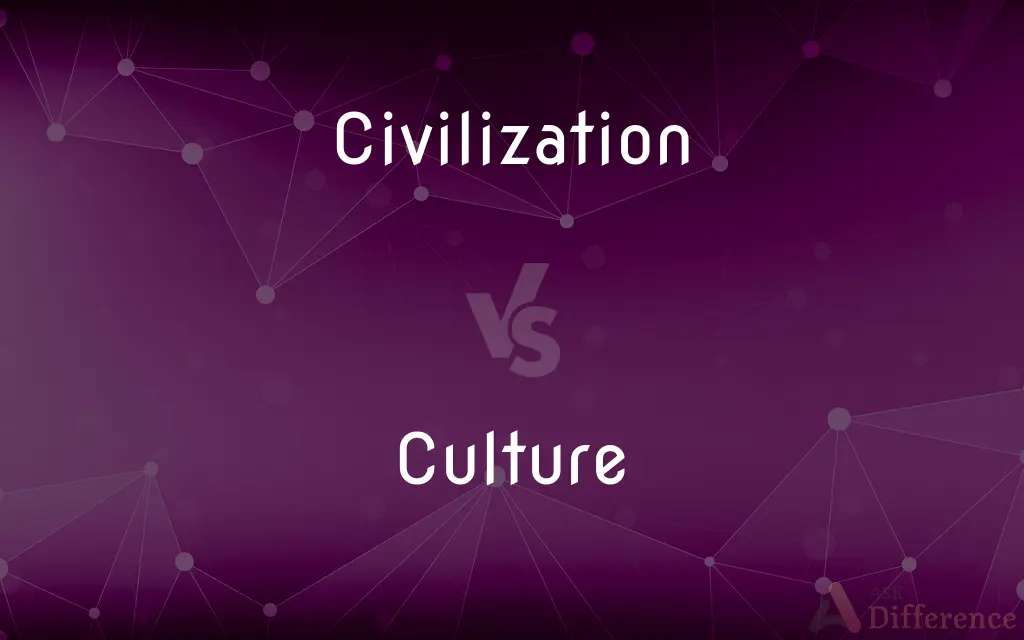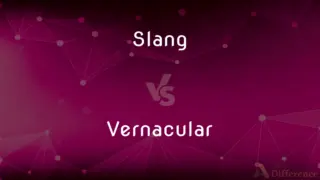Civilization vs. Culture — What's the Difference?
By Tayyaba Rehman — Updated on October 25, 2023
Civilization refers to the advanced state of human society with organized structures and cultures, whereas Culture embodies the beliefs, customs, arts, and behaviors of a particular society, group, or individual.

Difference Between Civilization and Culture
Table of Contents
ADVERTISEMENT
Key Differences
Civilization represents an advanced stage in human societal development characterized by the emergence of organized communities, governance, and infrastructure. In contrast, Culture represents the distinct ways of thinking, behaving, and interacting, as well as the symbols, arts, and artifacts shared by a particular group.
While Civilization is often seen as a reflection of a society's progress, with advancements in technology, governance, and social organization, Culture remains the soul of that society, encompassing its traditions, beliefs, and values.
The concept of Civilization often implies a sense of superiority, as it's used to classify societies based on their development and organization levels. Culture, however, does not denote any hierarchical structure and celebrates the diversity and richness of human expressions and traditions.
Civilization can often be quantified by looking at the tangible advancements like infrastructure, technology, and governance. Culture, on the other hand, is more qualitative, focusing on the intangible aspects such as beliefs, languages, rituals, and arts.
The interconnectedness of Civilization and Culture is undeniable. While Civilization provides the structural and functional frameworks for societies, Culture offers the underlying essence, guiding the way people in those societies perceive, think, and live.
ADVERTISEMENT
Comparison Chart
Definition
Advanced state of human societal development
Beliefs, customs, arts, and behaviors of a particular group
Tangibility
Often quantifiable (infrastructure, technology)
Intangible (beliefs, languages, rituals)
Hierarchical Implication
Implies a classification based on development levels
Celebrates diversity without hierarchy
Scope
Broad, encompassing entire societies
Can be individual, group-specific, or society-wide
Origin
Derived from societal advancements and organization
Derived from shared experiences, beliefs, and traditions
Compare with Definitions
Civilization
Civilization often showcases technological and infrastructural advancements.
Modern Civilization depends heavily on digital technology.
Culture
Culture embodies a society's beliefs and values.
Japanese Culture places a strong emphasis on honor and respect.
Civilization
Civilization can span across multiple cultures.
The Roman Civilization absorbed aspects of many cultures they conquered.
Culture
Culture includes arts, rituals, and traditions.
Indian Culture is rich in festivals and ceremonies.
Civilization
A civilization (or civilisation) is a complex society that is characterized by urban development, social stratification, a form of government, and symbolic systems of communication (such as writing).Civilizations are intimately associated with and often further defined by other socio-politico-economic characteristics, such as centralization, the domestication of both humans and other organisms, specialization of labour, culturally-ingrained ideologies of progress and supremacism, monumental architecture, taxation, societal dependence upon farming and expansionism.Historically, "a civilization" has often been understood as a larger and "more advanced" culture, in implied contrast to smaller, supposedly primitive cultures. In this broad sense, a civilization contrasts with non-centralized tribal societies, including the cultures of nomadic pastoralists, Neolithic societies or hunter-gatherers; however, sometimes it also contrasts with the cultures found within civilizations themselves.
Culture
Culture defines the way of life for individuals or groups.
Her Culture teaches the importance of community and family ties.
Civilization
An advanced state of intellectual, cultural, and material development in human society, marked by progress in the arts and sciences, the extensive use of record-keeping, including writing, and the appearance of complex political and social institutions.
Culture
Culture shapes the collective identity of a group.
Music and dance play a pivotal role in African Culture.
Civilization
The type of culture and society developed by a particular nation or region or in a particular epoch
Mayan civilization.
The civilization of ancient Rome.
Culture
Culture () is an umbrella term which encompasses the social behavior and norms found in human societies, as well as the knowledge, beliefs, arts, laws, customs, capabilities, and habits of the individuals in these groups.Humans acquire culture through the learning processes of enculturation and socialization, which is shown by the diversity of cultures across societies. A cultural norm codifies acceptable conduct in society; it serves as a guideline for behavior, dress, language, and demeanor in a situation, which serves as a template for expectations in a social group.
Civilization
The act or process of civilizing or reaching a civilized state.
Culture
The arts, beliefs, customs, institutions, and other products of human work and thought considered as a unit, especially with regard to a particular time or social group
Edwardian culture.
Japanese culture.
Civilization
Cultural or intellectual refinement; good taste.
Culture
These arts, beliefs, and other products considered with respect to a particular subject or mode of expression
Musical culture.
Oral culture.
Civilization
Modern society with its conveniences
Returned to civilization after camping in the mountains.
Culture
The set of predominating attitudes and behavior that characterize a group or organization
A manager who changed the corporate culture.
Civilization
An organized culture encompassing many communities, often on the scale of a nation or a people; a stage or system of social, political, or technical development.
The Aztec civilization
Western civilization
Modern civilization is a product of industrialization and globalization.
Culture
Mental refinement and sophisticated taste resulting from the appreciation of the arts and sciences
A woman of great culture.
Civilization
(uncountable) Human society, particularly civil society.
A hermit doesn't much care for civilization.
I'm glad to be back in civilization after a day with that rowdy family.
Culture
Special training and development
Voice culture for singers and actors.
Civilization
The act or process of civilizing or becoming civilized.
The teacher's civilization of the child was no easy task.
Culture
The cultivation of soil; tillage
The culture of the soil.
Civilization
The state or quality of being civilized.
He was a man of great civilization.
Culture
The breeding or cultivation of animals or plants for food, the improvement of stock, or other purposes.
Civilization
(obsolete) The act of rendering a criminal process civil.
Culture
The growing of microorganisms, tissue cells, or other living matter in a specially prepared nutrient medium.
Civilization
Collectively, those people of the world considered to have a high standard of behavior and / or a high level of development. Commonly subjectively used by people of one society to exclusively refer to their society, or their elite sub-group, or a few associated societies, implying all others, in time or geography or status, as something less than civilised, as savages or barbarians. cf refinement, elitism, civilised society, the Civilised World
Culture
Such a growth or colony, as of bacteria.
Civilization
The act of civilizing, or the state of being civilized; national culture; refinement.
Our manners, our civilization, and all the good things connected with manners, and with civilization, have, in this European world of ours, depended for ages upon two principles - . . . the spirit of a gentleman, and spirit of religion.
Culture
To cultivate (soil or plants).
Civilization
Rendering a criminal process civil.
Culture
To grow (microorganisms or other living matter) in a specially prepared nutrient medium.
Civilization
A society in an advanced state of social development (e.g., with complex legal and political and religious organizations);
The people slowly progressed from barbarism to civilization
Culture
To use (a substance) as a medium for culture
Culture milk.
Civilization
The social process whereby societies achieve civilization
Culture
The arts, customs, lifestyles, background, and habits that characterize humankind, or a particular society or nation.
Civilization
A particular society at a particular time and place;
Early Mayan civilization
Culture
The beliefs, values, behaviour and material objects that constitute a people's way of life.
Civilization
The quality of excellence in thought and manners and taste;
A man of intellectual refinement
He is remembered for his generosity and civilization
Culture
The conventional conducts and ideologies of a community; the system comprising the accepted norms and values of a society.
Civilization
Civilization is an advanced state of human society.
Ancient Egypt was a remarkable Civilization known for its pyramids.
Culture
(anthropology) Any knowledge passed from one generation to the next, not necessarily with respect to human beings.
Civilization
Civilization includes complex social, political, and cultural structures.
The Mayan Civilization had an advanced system of astronomy and mathematics.
Culture
(botany) Cultivation.
Civilization
Civilization denotes organized community living.
The Indus Valley Civilization had a well-planned urban design.
Culture
(microbiology) The process of growing a bacterial or other biological entity in an artificial medium.
Culture
The growth thus produced.
I'm headed to the lab to make sure my cell culture hasn't died.
Culture
A group of bacteria.
Culture
(cartography) The details on a map that do not represent natural features of the area delineated, such as names and the symbols for towns, roads, meridians, and parallels.
Culture
(archaeology) A recurring assemblage of artifacts from a specific time and place that may constitute the material culture remains of a particular past human society.
Culture
(euphemism) Ethnicity, race (and its associated arts, customs, etc.)
Culture
(transitive) to maintain in an environment suitable for growth especially of bacteria cultivate}}
Culture
(transitive) to increase the artistic or scientific interest in something cultivate}}
Culture
The act or practice of cultivating, or of preparing the earth for seed and raising crops by tillage; as, the culture of the soil.
Culture
The act of, or any labor or means employed for, training, disciplining, or refining the moral and intellectual nature of man; as, the culture of the mind.
If vain our toilWe ought to blame the culture, not the soil.
Culture
The state of being cultivated; result of cultivation; physical improvement; enlightenment and discipline acquired by mental and moral training; civilization; refinement in manners and taste.
What the Greeks expressed by their paidei`a, the Romans by their humanitas, we less happily try to express by the more artificial word culture.
The list of all the items of the general life of a people represents that whole which we call its culture.
Culture
The cultivation of bacteria or other organisms (such as fungi or eukaryotic cells from mulitcellular organisms) in artificial media or under artificial conditions.
Culture
Those details of a map, collectively, which do not represent natural features of the area delineated, as names and the symbols for towns, roads, houses, bridges, meridians, and parallels.
Culture
To cultivate; to educate.
They came . . . into places well inhabited and cultured.
Culture
A particular society at a particular time and place;
Early Mayan civilization
Culture
The tastes in art and manners that are favored by a social group
Culture
All the knowledge and values shared by a society
Culture
(biology) the growing of microorganisms in a nutrient medium (such as gelatin or agar);
The culture of cells in a Petri dish
Culture
(bacteriology) the product of cultivating micro-organisms in a nutrient medium
Culture
A highly developed state of perfection; having a flawless or impeccable quality;
They performed with great polish
I admired the exquisite refinement of his prose
Almost an inspiration which gives to all work that finish which is almost art
Culture
The attitudes and behavior that are characteristic of a particular social group or organization;
The developing drug culture
The reason that the agency is doomed to inaction has something to do with the FBI culture
Culture
The raising of plants or animals;
The culture of oysters
Culture
Culture can be expressed through language, food, and music.
Italian Culture is renowned for its culinary delights.
Common Curiosities
How does Culture differ from tradition?
While Culture encompasses beliefs, values, and behaviors, tradition specifically refers to long-standing practices passed down over generations.
Which came first, Civilization or Culture?
Culture predates Civilization. As humans formed groups, they developed shared beliefs and behaviors, leading to the emergence of cultures.
Is Culture static or dynamic?
Culture is dynamic; it evolves and changes over time based on various influences.
Can a Civilization consist of multiple cultures?
Yes, many civilizations, like the Roman Empire, incorporated and were influenced by multiple cultures.
Is every Civilization bound to have a unique Culture?
Not necessarily. While every Civilization has cultural aspects, they might share cultural elements with other civilizations.
How does Culture influence language?
Language is a reflection of Culture, capturing its history, values, and beliefs.
What is Civilization?
Civilization refers to an advanced state of human society marked by organized structures, governance, and cultures.
Why is preserving Culture important?
Preserving Culture maintains the identity, history, and richness of a society, offering insights into its past and guiding its future.
Can two different cultures share aspects of the same Civilization?
Yes, multiple cultures can exist within the framework of a broader Civilization.
Are all civilizations advanced in technology?
No, while many civilizations showcase technological advancements, the definition isn't solely based on technology.
How does Civilization impact economy?
Civilizations, with their organized structures, often lead to advanced trade, industry, and economic systems.
Can Culture exist without Civilization?
Yes, Culture, as shared beliefs and behaviors, can exist even without the organized structures of a Civilization.
How do arts reflect Culture?
Arts capture the essence, beliefs, emotions, and narratives of a Culture, serving as its mirror.
Can an individual have a personal Culture?
Yes, individuals can have personal cultures derived from their beliefs, experiences, and upbringing.
Do modern societies represent a single Civilization?
Modern societies have elements of multiple civilizations, influenced by globalization and interconnectedness.
Share Your Discovery

Previous Comparison
Slang vs. Vernacular
Next Comparison
Bestial vs. FeralAuthor Spotlight
Written by
Tayyaba RehmanTayyaba Rehman is a distinguished writer, currently serving as a primary contributor to askdifference.com. As a researcher in semantics and etymology, Tayyaba's passion for the complexity of languages and their distinctions has found a perfect home on the platform. Tayyaba delves into the intricacies of language, distinguishing between commonly confused words and phrases, thereby providing clarity for readers worldwide.














































